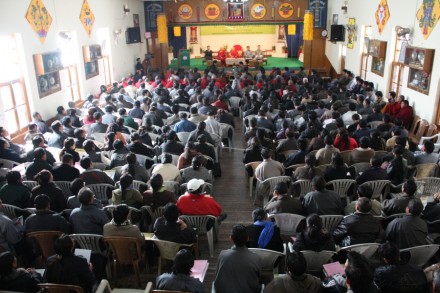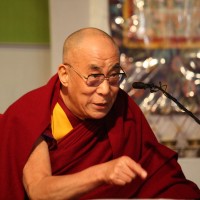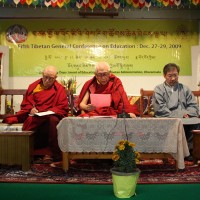
Describing the efforts made in education by Tibetans as one of the biggest achievements in the last five decades in exile, His Holiness the Dalai Lama today underlined the need to review the past to rectify the mistakes, and to make efforts to achieve even greater progress in the standard of education.
Dharamshala: His Holiness the Dalai Lama was addressing the inaugural session of the three-day 5th Tibetan General Conference on Education at Tibetan Children’s Village at lower Dharamsala.
His Holiness the Dalai Lama asked the participants to hold open and interactive discussion to explore effective ways to improve the quality of learnings in both traditional Tibetan studies and modern education.
His Holiness underscored the importance of preserving and promoting the Tibetan Buddhist culture, which he said has the potential to benefit the humanity.
Around 238 participants consisting of directors, principals, rectors and teachers representing 85 Tibetan schools from across India, Nepal and Bhutan are attending the conference. The members of Tibetan Parliament, Kashag and secretaries of all the departments were present.
Promotion of Buddhist Culture for Humanity’s Benefit
Calling Tibetan Buddhist culture as a culture of peace, non-violence and compassion, His Holiness said Tibetans being citizens of the world, have the responsibility to promote that culture which has the potential to benefit the entire humanity.
His Holiness emphasised the importance of extending support to the people of Himalayan region in their endeavour to study the Buddhist culture.
His Holiness the Dalai Lama spoke on the need to introduce study of Buddhist philosophy and dialectic (riglam) in the school’s academic curriculum. In order to promote and preserve the Tibetan culture for the benefit of the entire humanity, we need to facilitate the study of Buddhist teachings and philosophies in the community, His Holiness said. His Holiness urged both the lay and monastic community to actively participate and put their best efforts in this field of study.
Regarding the introduction of study of Buddhist dialectics in the school curriculum, His Holiness asked the department of education and the department of religion and culture to convene a committee to initiate the process.
His Holiness also emphasised the importance of translating teachings of Buddha and other Buddhist masters into Chinese language.
Kashag on Basic Education Policy
Outlining in its statement the essence of the Basic Education Policy of Tibetans in exile introduced in 2004, the Kashag said Tibetans should direct their concerted efforts toward the full implementation of the policy and to build a community of sufficient teachers.
Considering the role of teachers more important than the school administration, children and parents in implementing the basic education policy, Kalon Tripa said the essence of the policy can be implemented if teachers have clear understanding of the policy.
The Kashag said it wanted to ascertain the views and the level of understanding and trust of the school administration in the education policy.
The Kashag expressed its hope to clearly understand the basis and reasons of criticism on the policy made by Tibetans in exile and a section of experts in education systems.
The Kashag also hopes to clearly recognise the obstacles and hindrances faced by teachers while implementing the basic education policy in the schools.
The basic education policy serves the actual needs of the exile Tibetans in preserving the traditional Tibetan values and culture and may also serve as a basis for the education policy of future Tibet.
Under this policy, from the pre-primary level and up to class III, no other language besides Tibetan shall be taught and the teaching of second and third languages shall be started from class four and class six respectively.
Besides Mevon Tsugla Peton School, a model school, which undertakes full implementation of the BEP, some 13 other schools of the Sambhota Tibetan Schools Society, an autonomous body funded by the Education Department, has already introduced this policy at pre-primary and primary stages.
Specialisation in Diverse Academic Fields
There will be extensive discussion on how to facilitate young Tibetans to to achieve high degree of excellence and specialisation in diverse fields of professions and learning. The Kashag also invited recommendations from the participants on this issue.
Discussions on the resolutions passed during the 4th conference and improving studies of Tibetan language and culture are also in the agenda.
The last four general conferences were held in 1964, 1972, 1985 and 2003.


